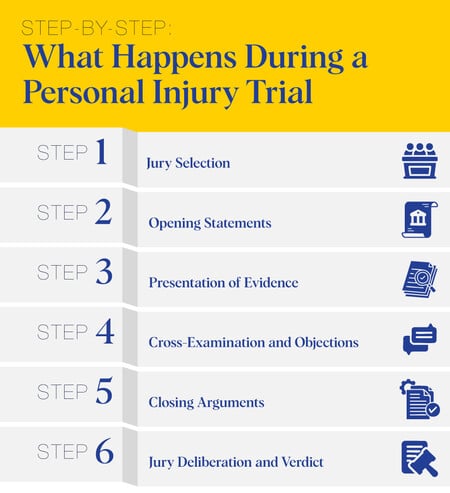Participating in any type of legal case can be stressful and confusing. If your case goes to trial, it can become more complex, making it essential to understand the steps of the trial preparation process.
When selecting a personal injury attorney, trial experience is crucial. At Lawrence & Associates, our attorneys are not only skilled in settlement negotiations but also fully prepared to take cases to trial when necessary to secure the compensation our clients deserve. With extensive courtroom experience across Ohio and Kentucky, we understand the nuances of litigation and the pressure that comes with it. Whether you’re dealing with a car accident, workers’ compensation, or a complex injury case, we have the expertise to build a compelling case for a jury. If you’re looking for a law firm with a proven track record of trial success, Lawrence & Associates is here to fight for you, both in and out of court.
“\We’re not just your attorneys—we’re your allies, here to walk every step of the journey with you.” – Attorney Justin Lawrence“
If your case does go to trial, here’s what you can expect and how our team will guide you through every step of the process.
Why Do Some Personal Injury Cases Go to Trial?
While most cases settle, some go to trial due to liability disputes, low settlement offers, or policy limits. You should always be prepared for a trial just in case one of these unique circumstances surfaces. At Lawrence & Associates, our goal is to negotiate favorable settlements, but we are fully prepared to litigate when necessary.
Step-By-Step: What Happens During a Personal Injury Trial

Jury Selection
The jury selection process is known as voir dire, a French term meaning “to speak the truth.” This is where potential jurors are questioned to ensure they can be impartial and fair.
During this process, a judge and attorneys ask potential jurors questions about their backgrounds, beliefs, and potential biases to determine their suitability for a trial. After questioning, jurors can be dismissed for cause or through a limited number of peremptory challenges.
Opening Statements
At the opening statements, attorneys from both sides will present a roadmap of the case, outlining the facts they intend to prove and the evidence they will use.
Presentation of Evidence
In a civil trial, the plaintiff presents their case-in-chief first, followed by the defense. We use treating providers, independent experts, and clear exhibits to connect the dots between the crash, your injuries, and your losses. Our seasoned attorneys work hard to build a compelling case for our clients.
Cross-Examination and Objections
Cross-examination is the stage in a trial where the opposing attorney questions a witness who testified during direct examination. The purpose is to challenge the credibility of the witness, test the accuracy and reliability of their statements, and expose contradictions or weaknesses in their testimony.
Objections are formal protests made by attorneys during a trial to challenge evidence or the way a question is asked. The goal is to ensure the trial follows the rules of evidence and procedure.
Closing Arguments
Closing arguments are the final statements made by each side after all the evidence has been presented. It is each attorney’s last chance to persuade the judge or jury before deliberation. There are several goals of this step, including summarizing the key evidence and testimony, highlighting the strengths of the case, pointing out the opposing side’s weaknesses, and appealing to logic and emotion to persuade the jurors.
Jury Deliberation and Verdict
After the closing arguments, the judge gives the jury instructions on the law and the legal standards to be applied, also called jury instructions. Then the jury begins deliberation, a private discussion to reach a decision. During this time, the jury goes to a private room to review the case and will consider the testimony and evidence, the burden of proof, and the judge’s legal instructions.
The jury must reach a verdict, either unanimously or by majority, depending on the jurisdiction and the type of case. If the defendant is found liable, the jury may award compensatory damages to cover actual losses, general damages for non-economic harm, and, in some cases, punitive damages to punish the defendant for especially harmful or reckless behavior.
What Happens After the Verdict?
After the verdict, there may be several different outcomes, including a favorable verdict, an appeal, or post-trial motions. If the defendant is liable, the jury or judge may award damages. However, either side may choose to appeal the decision if they believe legal errors occurred during the trial.
Facing Trial With Confidence: How Lawrence & Associates Stands by You
If you are facing a legal challenge, do not wait; our dedicated team is here to help. At Lawrence & Associates, we pride ourselves on being highly responsive, locally rooted, and always ready to go to trial to protect your rights.
With a strong presence across Ohio and Kentucky, we understand the local community, along with its courts and judges, and we’re prepared to fight for the case outcome you deserve.
Schedule your free consultation today and speak directly with an experienced attorney—no pressure, just straightforward answers and honest advice. Learn more about us by reviewing our Bill of Rights and client stories.
